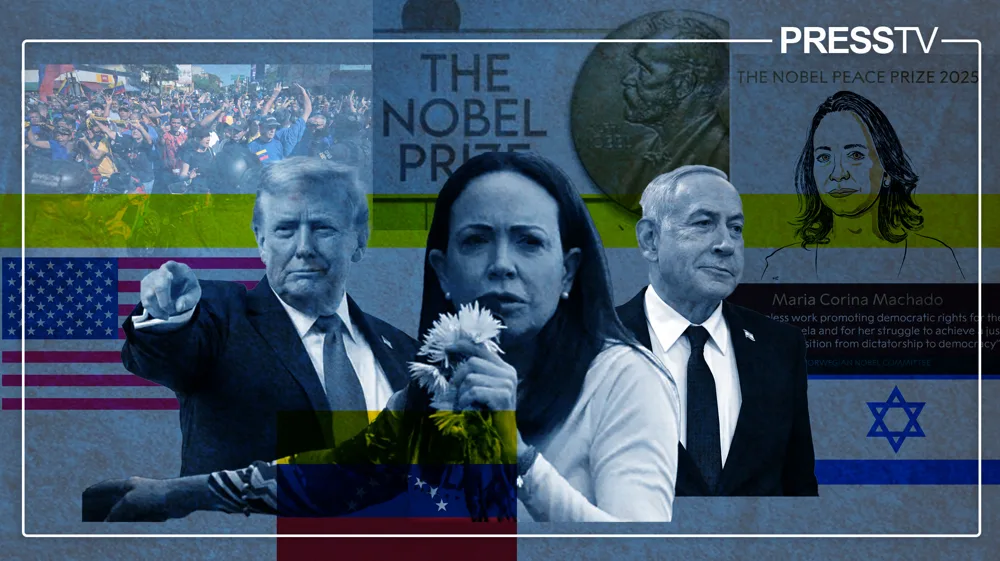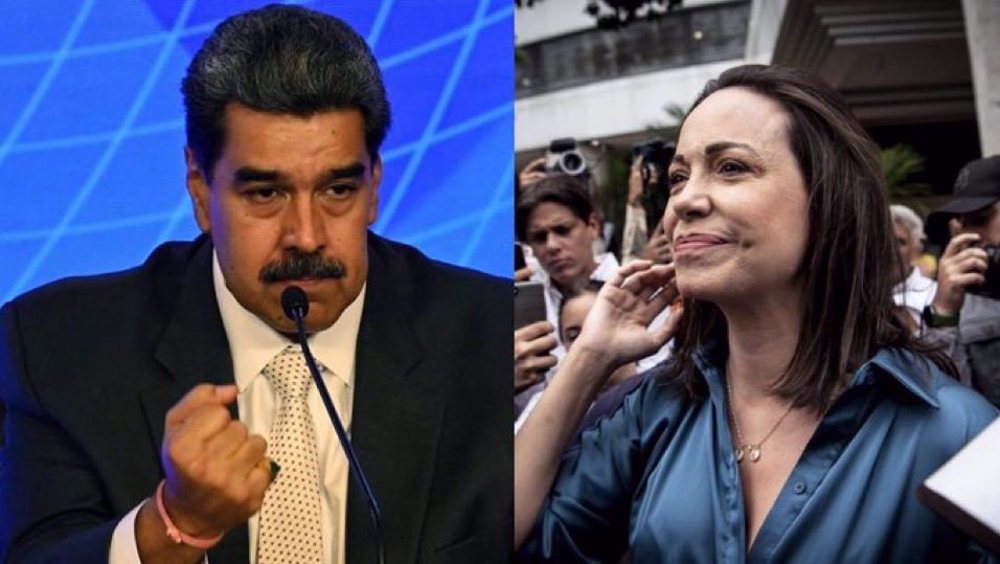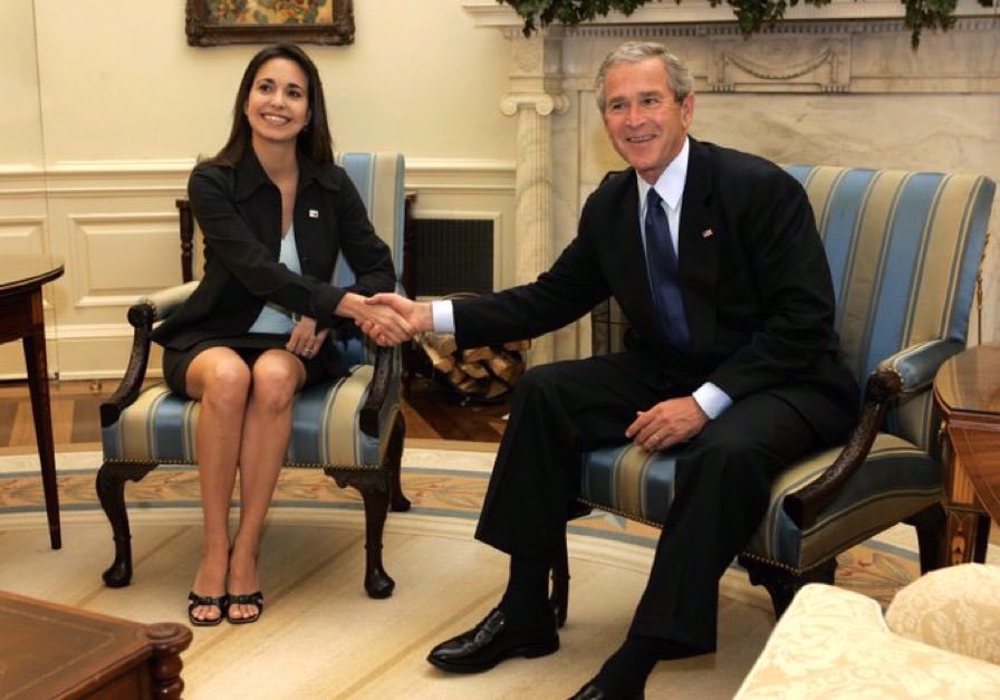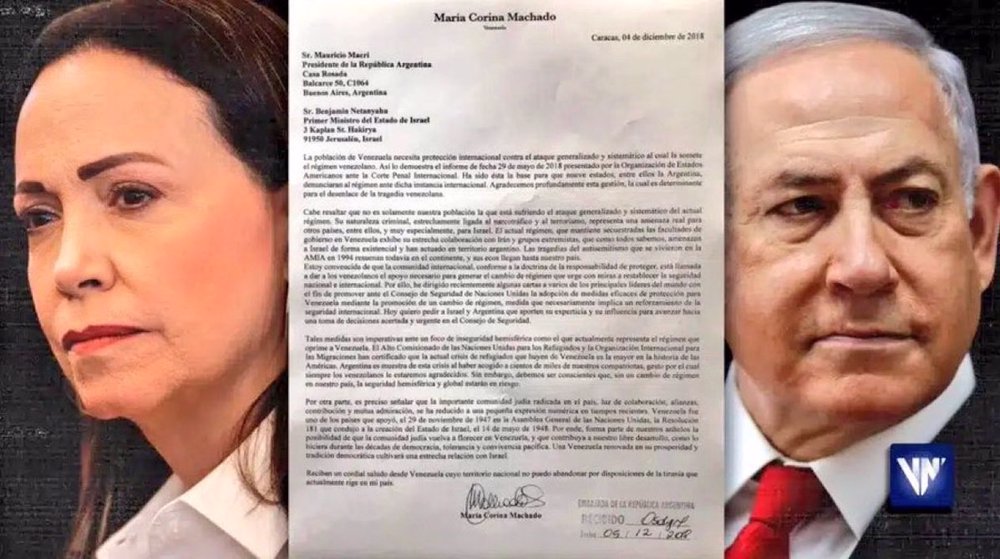Nobel ‘War’ Prize: Machado Awarded for Advocating US, Israeli Attack on Venezuela


Orinoco Tribune – News and opinion pieces about Venezuela and beyond
From Venezuela and made by Venezuelan Chavistas

By Maryam Qarehgozlou – Oct 11, 2025
María Corina Machado, a Venezuelan politician notorious for advocating American and Israeli military intervention in her country, has been awarded the 2025 Nobel Peace Prize – sparking global outrage.
“She is receiving the Nobel Peace Prize for her tireless work promoting democratic rights for the people of Venezuela, and for her struggle to achieve a just and peaceful transition from dictatorship to democracy,” said the Norwegian Nobel Committee while announcing the much-anticipated award.
The committee rebuffed US President Donald Trump despite his intense lobbying, but ended up giving it to someone who has aggressively supported and promoted the US “regime change” project in Caracas.
For many around the world, the decision underscores how Western governments continue to manipulate moral symbols to advance their nefarious political agendas.
Awarding a “Peace Prize” to a figure widely seen as a US-backed coup plotter and a supporter of Israel’s genocidal war on Gaza has once again exposed the Nobel Committee’s transformation into a geopolitical tool of the West — serving imperial interests rather than global peace, analysts warned.
They recalled how Machado, long embraced by Washington’s “regime-change” lobby, had previously written directly to Israeli Prime Minister Benjamin Netanyahu — who is wanted by the International Criminal Court for genocidal war crimes in Gaza — pleading for his support in overthrowing Venezuela’s democratically elected president, Nicolás Maduro.
Her public dedication of the prize to Trump only reinforced the perception that the award was less a recognition of peace-building and more a celebration of subversion.
The Norwegian Nobel Committee awards the Nobel Peace Prize to Venezuelan politician Maria Corina Machado
Follow: https://t.co/mLGcUTSA3Q pic.twitter.com/Yy4lzlZa7j
— Press TV 🔻 (@PressTV) October 10, 2025
From opposition leader to symbol of regime change
Machado, a 58-year-old industrial engineer, is currently living in hiding in Venezuela after being disqualified from contesting the 2024 presidential election.
The country’s Supreme Court upheld a 15-year ban against her, citing her direct support for US sanctions, involvement in large-scale corruption, and responsibility for massive financial losses suffered by Venezuela’s foreign assets — including the US-based oil refiner CITGO and the Colombia-based chemicals firm Monómeros.
According to the court’s findings, Machado played a role in the “corruption plot orchestrated by the usurper Juan Guaidó,” the opposition leader who once declared himself “interim president” of Venezuela with Washington’s patronage.
Guaidó’s rise was a textbook example of a foreign-orchestrated “regime change” project.
A relatively lesser-known opposition lawmaker, Guaidó rose to sudden prominence in January 2019 when he declared himself “interim president” of Venezuela, claiming that Maduro’s 2018 re-election was illegitimate.
Within hours, the US and its allies — including certain European nations — recognized him as the country’s leader, seized Venezuela’s overseas assets, and poured financial support into his faction.
The goal was to topple Maduro’s legitimate government through a mix of economic strangulation, political isolation, and internal destabilization.
Although dozens of Western governments initially backed Guaidó, he never gained control of the military or state institutions, and over time, his “interim government” lost both credibility and cohesion.
By late 2022, even parts of the opposition abandoned the experiment and formally dissolved the interim presidency, marking Guaidó’s ouster from his self-proclaimed post — an end to a foreign-engineered bid for power that had brought turmoil but failed to dislodge Maduro.
In 2023, Venezuelan judicial officials issued an arrest warrant against Guaido, charging the politician with multiple illegal activities, including treason, money laundering, impersonating public officials, and, above all, misappropriation of $19 billion of the resources of the PDVSA oil company and using money from the country’s state-owned oil company for his own financial benefit.
Following the collapse of Guaidó’s US-backed so-called “interim government,” Washington and the Venezuelan opposition quickly shifted their hopes to Machado, long known for aligning herself with foreign interests against the elected government in Caracas.

Like Guaidó, who later fled to Miami, Machado built her profile through Western media promotion and US political endorsement, portraying herself as the new face of “democratic change.”
After Guaidó’s failure exposed the opposition’s dependence on foreign backing and internal corruption, Machado sought to rebrand that same movement — calling for more sanctions and international pressure on the Maduro government rather than reconciliation.
Her disqualification from the 2024 presidential race became a rallying cry abroad, yet inside Venezuela, many viewed her as the continuation of the same externally driven strategy that had deepened the Latin American country’s crisis.
In essence, Machado inherited Guaidó’s role as the latest figurehead of a Washington-orchestrated opposition, one that repeatedly undermined dialogue, invited economic punishment on its own people, and failed to win the trust of the Venezuelan majority that continued to back Maduro’s government.
After the 2024 presidential election, which Maduro won amid high turnout and strong support from working-class communities against Edmundo González Urrutia, the candidate Machado backed, she and her foreign-backed allies refused to accept the results, claiming fraud without credible proof.
She incited protests across the country that quickly turned violent, with opposition groups blocking roads, attacking public buildings, and clashing with security forces.
The government described these disturbances as part of a destabilization campaign orchestrated from abroad to delegitimize Venezuela’s democratic process and provoke chaos.
While authorities restored order, Maduro called for unity and peace, lashing out at Machado for trying to reignite the same failed regime-change strategy once led by Guaidó — this time through street violence rather than ballots.
More recently, Machado publicly supported the deployment of US warships to the southern Caribbean under the pretext of combating drug cartels — a move Caracas denounced as yet another act of aggression aimed at surrounding and intimidating Venezuela.

Machado’s Peace Prize: A gift to Washington
After the Nobel Committee announced her as the 2025 Peace Prize laureate, Machado took to social media to dedicate her win to Trump, praising him for his “decisive support of our cause.”
Her statement drew sharp criticism, with many viewing her gesture as proof that the award was a reward for loyalty to Washington, not for service to global or regional peace.
Machado’s win crushed Trump’s Nobel Peace Prize dream, despite his lobbying efforts, and his administration denounced the decision to award it to her.
However, in his remarks on Friday evening, Trump said he spoke with Machado, adding that she was “very nice” in their call.
“The person who actually got the Nobel Prize called today, called me and said, ‘I’m accepting this in honor of you, because you really deserved it,’” the president said.
“I’ve been helping her along the way,” Trump added. “They need a lot of help in Venezuela, it’s a basic disaster.”
Trump’s comments laid bare what was known: that Machado’s Nobel is not a recognition of peace, but a symbolic victory in Washington’s long-running campaign to undermine Venezuela’s sovereignty.
Global backlash
The Nobel Committee’s decision to award Machado sparked an immediate global backlash.
Activists, political commentators, politicians, and journalists flooded social media with posts denouncing the blatant politicization of the world’s once most prestigious award.
Many noted that the decision undermined the Nobel Committee’s credibility and exposed its deep entanglement with Western power structures.
Across digital platforms, users circulated evidence of Machado’s longstanding pro-Western agenda and her repeated calls for foreign intervention and war against Venezuela.
Tim Anderson, scholar-activist and Director of the Centre for Counter Hegemonic Studies, condemned the award in a post on X, calling it a reward for a “CIA-backed coup plotter.”
“Reward for coup plotter. CIA-backed Venezuelan traitor Maria Corina Machado BEATS warmonger Trump got the tainted Norwegian #Nobel prize, amid fake rumors of her arrest,” he wrote.
Anderson also shared a photo of Machado shaking hands with former US President George W. Bush at the White House in May 2005, calling out her “tireless struggle” as a career built on enriching herself and selling her country’s assets to the US oligarchy.
Users also replugged a 2018 letter written by Machado to Netanyahu, in which she explicitly requested Israel’s assistance in toppling Venezuela’s elected government.
“In truth, her ‘peaceful transition’ meant foreign interference and regime change — the classic Western recipe for destroying sovereign nations under the banner of democracy,” independent outlet DD Geopolitics wrote on X, referencing the Nobel Committee’s statement justifying its decision.
Muhammad Shehada, a Gaza-based political analyst and writer, called Machado a “genocide supporter” for her alliance with Israel’s far-right Likud Party.

“The Nobel Committee just gave its Peace Prize to a genocide supporter!” he wrote. “She signed an alliance agreement with Netanyahu’s Likud; calls for reestablishing relations with Israel; calls Israel a ‘genuine partner’; and said ‘I myself look forward to visiting [occupied territories].’”
Shehada added that awarding Machado the Nobel Peace Prize may have been a “strategic decision.”
“Since Trump supports her to collapse the Maduro regime in Venezuela, it would be difficult for him to oppose her Nobel win!” he noted.
Machado formally signed an “alliance” between her political party and Israel’s Likud Party in 2020 — the same year she told Israeli media she would relocate Venezuela’s embassy to occupied al-Quds if she came to power.
She has also openly declared, “The struggle of Venezuela is the struggle of Israel.”
British journalist Afshin Rattansi also shared footage of Machado’s interviews, noting that “Like many other US-backed Latin American politicians, her policies are copy & paste support for Israel, support for Washington’s neoliberalism, and servitude to US hegemony… So what has she actually done to win a Nobel Peace Prize?”
Ali Abunimah, Palestinian-American journalist and editor of The Electronic Intifada, also described Machado as a “US-funded regime-change activist.”
“Did you think Gaza’s doctors might get @NobelPrize for peace? Nope. It went to Venezuela’s Marina Corina Machado, here addressing ‘Patriots for Europe,’ an ultra-far-right grouping which includes ‘Israel’s’ genocidal Likud Party,” he wrote.
In February, Machado delivered a message to the European “Patriotas” party meeting in Madrid, urging support to “remove the regime from power” in Venezuela.
“We are going to remove this regime from power,” she declared. “We Venezuelans have already decided and are moving in that direction.” She described Venezuela as “the greatest threat facing the West on our continent” for hosting “organized crime” and “the safe settlement of the enemies of democracy in the world.”
The Madrid conference also featured notorious anti-Muslim figures such as Geert Wilders, Marine Le Pen, and Hungarian Prime Minister Viktor Orbán — underlining Machado’s growing alignment with the far-right networks of the West.
Glenn Diesen, a Norwegian political scientist and analyst, also questioned the logic behind the Nobel Committee’s decision.
“Why give the Nobel Peace Prize to an opposition leader who applauds US pressure against her country when the US Navy is preparing for an attack on Venezuela?” he wrote. “Is the logic that democracy delivers peace, and the US military delivers democracy through war?”
Former Member of the European Parliament Mick Wallace was equally scathing, describing Machado as a “servant of US imperialism.”
“A servant of US Imperialism wins the Nobel Peace Prize, what a joke..?” he wrote. “She has Kissinger, Obama, Abiy Ahmed + others for company. If the prize meant anything anymore, someone fighting the Israeli Genocide in Gaza would have won it. But US Empire picks the winner…”
Max Blumenthal, editor of The Grayzone website, also denounced the award, saying the committee’s decision was part of a broader political attempt to justify Trump’s aggression against Venezuela.
UN Security Council expressed concern over the US military’s sinking of four Venezuelan vessels in international waters, with the Russian envoy strongly criticizing the US for employing a shoot-first cowboy approach.
Follow: https://t.co/B3zXG74hnU pic.twitter.com/nLOlajY7Fo
— Press TV 🔻 (@PressTV) October 11, 2025
Blumenthal noted that Machado is a “US govt-funded regime change activist who’s helped lead failed military coups, violent street riots, and has likely promised her country’s oil and mineral wealth to a consortium of MAGA-aligned billionaires in exchange for financing her political arsonism.”
Blumenthal also described her as a “marionette” of US Secretary of State Marco Rubio.
“[She] is a creation of the CIA-sponsored Gusano Industrial Complex that has brought violent terror and siege to any Latin American country defying the Washington Consensus of privatization and austerity, and a would-be Pinochet in a skirt.”
He added that Machado “has spent years lobbying for US and EU starvation sanctions on her own country, resulting in waves of migration to the US, fueling the nativist resentment that gave rise to Trump.”
“When Trump shipped Venezuelan migrants to a torture camp in El Salvador this year, Machado predictably sided with Trump, the main sponsor of her putchist career, over her countrymen. Giving the Nobel to Machado is a green light for regime change war on Venezuela, and then Cuba.”
Blumenthal said that the decision was fully consistent with the Nobel Committee’s record as a “soft power instrument of Western empire.”
He also drew parallels between Machado’s award and previous controversial laureates.
“Just recall its award to Obama at the beginning of his first term, granting him infinite legitimacy in advance of his destruction of Libya, escalation of wars in Iraq and Afghanistan, and facilitation of Gaza’s decimation,” he said.
“Given that nothing has happened in Machado’s career without the support and guidance of Washington, the Committee’s decision must be seen as the result of another Western op – a coup in Oslo to pave the way for one in Caracas.”
Over the years, the Nobel Peace Prize has become increasingly politicized — a symbol not of moral achievement, but of geopolitical alignment.
Experts note that the prize often reflects Western political priorities rather than genuine contributions to peace, which is why warmongers and imperial architects are so often honored in its name.
Past recipients underscore this trend: former US President Barack Obama, whose drone wars devastated entire regions of West Asia; Aung San Suu Kyi, under whose rule Myanmar’s Rohingya Muslims suffered mass killings; Shimon Peres, the Israeli leader implicated in war crimes against Palestinians; and Narges Mohammadi, a Western-backed provocateur of unrest in Iran.
For many, Machado’s inclusion in this ‘hall of ill-fame’ simply confirms what the Nobel Peace Prize has long become — not a tribute to peace, but an instrument of empire.
(PressTV)